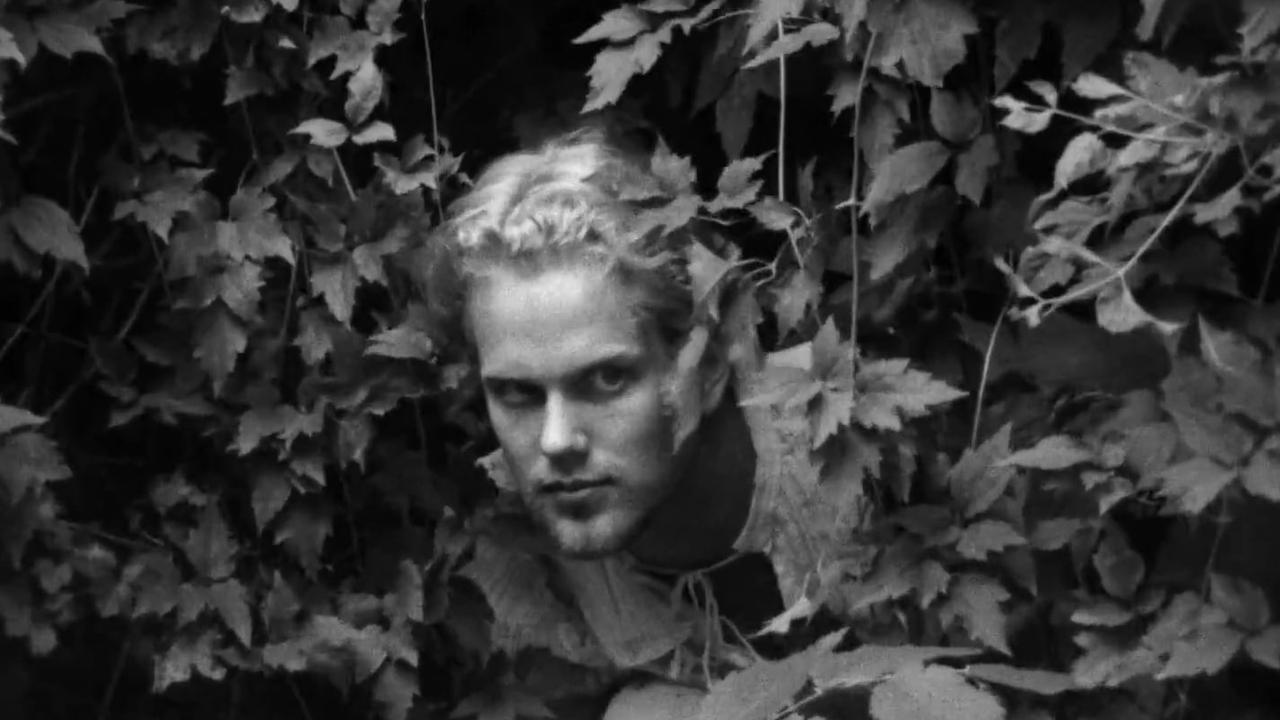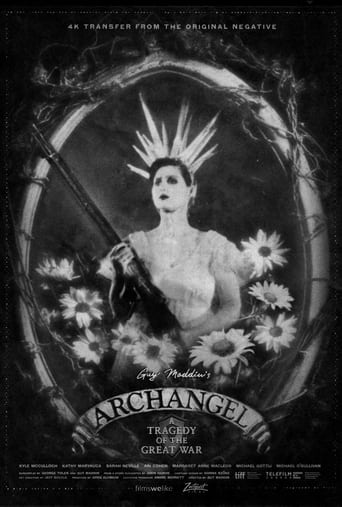

Part black comedy, part romantic drama, and part horrific war film-"Archangel" manages to blend these genres with its consistent surrealist style, the style that practically all of Canadian filmmaker Guy Maddin's films are made of. Before I continue this review I'd like to point out that I absolutely ADORE the films of Guy Maddin. I think of him as the Canadian David Lynch (and Lynch is my all time favorite filmmaker, so that's high praise), but comparing him to other icons doesn't truly do his work justice. He certainly has his own, distinct style, his films always mimic the visuals of a silent film, particularly those of Eisenstein. He also experiments a lot with use of overdubbing dialogue, a dreamlike atmosphere, and bizarre, dark humor. His style is not for everybody, but for those that can appreciate this oddball genius his films come across like underrated treasures, and "Archangel" may just be my very favorite.This film is both gruesome and powerful, it makes a statement about dealing with love and loss, while also entertaining us with its wacky plot and laugh out loud humor. I had a ball watching this bizarre, tragicomic tale, mainly due to its fast paced nature and heavy surrealism. Those who seek an other wordly experience will likely adore this film, for I think it best captures Maddin's famously odd style. The acting is at times somewhat wooden, but its obvious that this is the movie's intent. Much of the jokes are performed in a completely deadpan and slightly awkward manner, which makes them even funnier. The dialogue is great, the visuals are beautiful, the story is brilliantly weird, and I cannot find a single problem with this little masterpiece. Those who enjoy the avant garde must see this film as soon as possible!
... View MoreBut seriously, you have films being made out there that are budgeting around $500,000,000 and then there are films like this; not even nominated for any major motion-picture awards? In my world, this is an Academy Award winner for best picture // and it only cost 50,000 Canadian Dollars! ARCHANGEL, at first, was a slippery slope, but somehow elevated to a nice, flat plain of gorgeousness. We have a typical Guy Maddin story (B/W) based in 1919 about an amnesiac soldier named John Boles (no big names in this film) who sets out to find his true love, Iris, in Archangel, Russia where the Great War has already ended three months prior, but they have not received word about it yet. Obviously, the whole thing can be looked at as a gag; people wasting their time, dying (perhaps) when they shouldn't be. A lot of elements stuck out to me during this story that makes me believe that YOU CAN WATCH THIS FILM A MILLION TIMES AND NEVER, EVER, EVER, EVER GET BORED.Let us start right off the bat and mention that this film was VERY EISENSTEIN- ESQUE. Definitely not a bad thing; we all love IVAN THE TERRIBLE, but for some amount of individuals, it is just not their cup of cameo-mocha tea. The things I find similar are the CINEMATOGRAPHY; very old fashioned just as Eisenstein had it in the 40s and 50s // then there is the SET DESIGN, which is the biggest in my opinion, because, as complex as the movie may seem, it was such a simple development and everything (costumes and all) ran smoothly (nothing seems too quirky or fake). He really gave a sense of direction regardless of how amateur the locations seem.**Speaking of Eisenstein's Ivan the Terrible: Part II, ARCHANGEL used a similar effect towards the end to give the audience a sense of direction from one place to another; one, red tint // one, blue tint. Very beautiful.I rated Guy Maddin's Twilight Nymphs (pretty low, in fact) and couldn't help but feel betrayed by him. Now after seeing this project, I want to RE-WATCH that film until I can find the greatness in it. THE MADDINESS!! if you will..***But like other Maddin films, this one has the same style of dialogue. That means, unnecessary laughs and confusion all around the audience. BUT I LOVE IT. Like I said, this movie you can see numerous times and always get a different out-look on it. Some things you might take to heart, but others you might find are actually part of the story and fit very well // however quirky or surreal they may seem. My favorite line comes from Iris's second lover, Philbin, when he says:+ PHILBIN: I believe there is a reason for everything. For instance, someone shaved my mustache while I slept last night. What could that mean? +I think this film is very easy to understand, even for a baby.. okay, maybe not really, but some might thinks there's too much going on. BE PATIENT, the story will come to you. Besides, there is written text shown to update you every once in a while of what it happening in the scenes. *****There is a scene with someones intestines that I REALLY want to bring up, but I do not want to contain any spoilers in my reviews. **If you watch this film or have already embarked upon it, then you will know what I am talking about; Hehe.I hereby rate thee film a 10 OUT OF 10!!! I know, many will concur, but film for me is a serious art form. While some things out their are being made with no effort, money wasted, and DREAMS CRUSHED.. it is works like this that can really make you take a second and actually appreciate LOVE, FRIENDSHIP, POSSESSIONS, or even COURAGE/BRAVEY; claiming your part in the world. And I got all of that from Guy Maddin's Archangel. - Heart-on!-- Michael Mendez
... View MoreThe sophomore feature from Winnipeg director Guy Maddin confirms the promise of his offbeat 1988 debut 'Tales From the Gimli Hospital', although perhaps with a hint of understandable redundancy. Maddin's peculiar aesthetic is the same, borrowing extensively from the primitive vocabulary of early sound productions (circa 1928-1930), but this time the action is updated from Icelandic fable to the Russian Revolution, a popular setting for Hollywood melodramas during the late silent/early sound era. Every anachronism is flawlessly presented, from the flickering black and white photography to the scratchy music score and crude post-dubbed dialogue, but like 'Gimli Hospital' the macabre (to say the least) plot is pointed straight at today's midnight cult cinephiles. Only the details are different: instead of dead seagull therapy and ritual butt-grabbing duels to the death (both highlights of the earlier film), audiences can enjoy an odd, amnesiac love quadrangle, climaxing when one character uses his own intestines to strangle the Bolshevik barbarian who disemboweled him. Not surprisingly, comparisons have been drawn to the early films of David Lynch, who next to Maddin is more in the same league as Frank Capra.
... View MoreDuring the First World War, a Canadian soldier, devastated by the recent death of his fiancee, arrives at the frozen Russian city of Archangel. While billeted with a local family, he is astonished to discover a woman that may or may not be the lover he thought lost. Unfortunately, she is suffering from amnesia and remembers nothing of their former passion. A rival suitor, claiming to be her husband and who may also be suffering from amnesia, is equally unsuccessful at winning her affection. The melancholy story plays itself out against the madness of the Great War.Filming entirely indoors with homemade props and costumes, director Guy Maddin has created a very strange and intense movie. Cribbing heavily from the look and atmosphere of German expressionist cinema, Maddin goes much further in exploring some very human issues: loss, love, memory and redemption. He also examines patriotism and by stylistically depicting the horrors of trench warfare he delivers a pacifist message that reminds me of movies like Grande Illusion and All Quiet on the Western Front. The ultimate power of this movie, however, lies in the sense of alienation we see among the characters. They are not only unable to love each other, they are barely able to communicate. In fact, under the cloud of forgetfulness that is a major theme in this movie, the characters are often not even capable of recognizing one another at all!
... View More